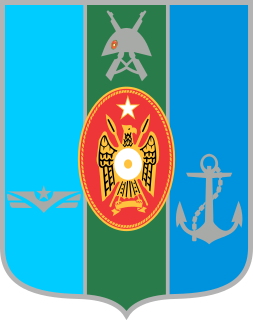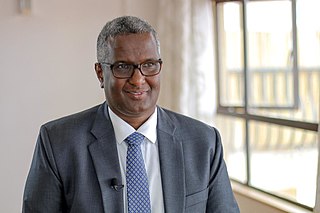Related Research Articles

Somalia, officially the Federal Republic of Somalia is a sovereign country in the Horn of Africa. It is bordered by Ethiopia to the west, Djibouti to the northwest, the Gulf of Aden to the north, the Indian Ocean to the east, and Kenya to the southwest. Somalia has the longest coastline on Africa's mainland. Its terrain consists mainly of plateaus, plains, and highlands. Hot conditions prevail year-round, with periodic monsoon winds and irregular rainfall.

The politics of Somalia takes place in a framework of federal parliamentary representative democratic republic. According to the Constitution of Somalia, the President of Somalia is head of state, and Prime Minister as head of government who is appointed by the President with the parliament's approval.

The Somali Armed Forces are the military forces of the Federal Republic of Somalia. Headed by the President as Commander in Chief, they are constitutionally mandated to ensure the nation's sovereignty, independence and territorial integrity.

Greater Somalia is a concept to unite all Somali speaking nations comprising the regions in or near the Horn of Africa in which ethnic Somalis live and have historically inhabited. The territory historically encompassed British Somaliland, Italian Somaliland, French Somaliland, the Somali Region in the Ethiopian Empire and the Northern Frontier District Now North Easten Province in the Colony and Protectorate of Kenya. At the present day, it encompasses Northern De facto Somaliland, southern Somalia, eastern Djibouti, the Somali region and Dire Dawa in Ethiopia, and the Lamu, Garissa, Wajir and Mandera Counties in Kenya.

Abdullahi Yusuf Ahmed was a Somali politician and former Colonel in the Somali National Army. He was one of the founders of the Somali Salvation Democratic Front, as well as the Puntland State of Somalia, where he served as the autonomous region's first President. In 2004, Ahmed also helped establish the Transitional Federal Government, which he led as President of Somalia from 2004 until 2008.

The Somali Civil War is an ongoing civil war taking place in Somalia. It grew out of resistance to the military junta led by Siad Barre during the 1980s. By 1988–1990, the Somali Armed Forces began engaging various armed rebel groups, including the Somali Salvation Democratic Front in the northeast, the Somali National Movement in the northwest, and the United Somali Congress in the south. The clan-based armed opposition groups overthrew the Barre government in 1991.

Sharif Sheikh Ahmed known as "The Father of Modern Somalia" because of his achievements when he served as president of the Transitional Federal Government between 2009 and 2012. He was the 7th President of Somalia and successfully brought the Federal Government of Somalia through transitional status following the collapse of the previous governing administration in 1991. Under Sheikh Sharif's leadership, the Transitional Federal Government succeeded in driving out Al-Shabaab from the capital city and its surroundings, establishing security, peace and reconciliation through the difficult transitional period. The administration of Sharif is also credited with developing the country's constitution and setting up key institutions such as the police, military and judiciary. He established the Somali National Army, opened the main sea port and relaunched the relaunched the central bank. He is the founder and leader of Himilo Qaran political party and also the founder and head of the Forum for National Parties of Somalia.

The Transitional Federal Government (TFG) was the internationally recognized government of the Republic of Somalia until 20 August 2012, when its tenure officially ended and the Federal Government of Somalia was inaugurated. The TFG was established as one of the Transitional Federal Institutions (TFIs) of government as defined in the Transitional Federal Charter (TFC) adopted in November 2004 by the Transitional Federal Parliament (TFP).
Hassan Dahir Aweys is a Somali political figure who was added to the U.S. government's list of terrorists in 2001. Aweys was the head of the 90-member shura council of the Islamic Courts Union (ICU) of Somalia and was viewed as one of the more radical leaders of the Union, which promoted shari'a and directed the militias that took control of the Somali capital of Mogadishu in June 2006. An eight-member executive committee was headed by the more moderate Sharif Sheikh Ahmed. The BBC stated "It is still not clear which man is more powerful." Aweys resigned from the ICU on 28 December 2006, at the end of ICU rule in Mogadishu.

The Somalia War, Ethiopian Invasion Of Somalia, or Ethiopian intervention in Somali Civil War, was an armed conflict involving largely Ethiopian and Somali Transitional Federal Government (TFG) forces and Somali troops from Puntland versus the Somali Islamist umbrella group, the Islamic Court Union (ICU), and other affiliated militias for control of the country. The war officially began shortly before July 20, 2006 when U.S-backed Ethiopian troops invaded Somalia to prop up the TFG in Baidoa. The TFG in Somalia invited Ethiopians to intervene, which became an "unpopular decision". Subsequently, the leader of the ICU, Sheik Hassan Dahir Aweys, had declared that, "Somalia is in a state of war, and all Somalis should take part in this struggle against Ethiopia". On December 24, Ethiopia stated it would actively combat the ICU.

The Advance of the Islamic Courts Union is the period in the Somali Civil War that began in May 2006 with the Islamic Courts Union's (ICU) conquest of Mogadishu from the Alliance for the Restoration of Peace and Counter-Terrorism (ARPCT) and continued with further ICU expansion in the country. Following the outbreak of the war on December 21, 2006; by December 24, direct Ethiopian intervention in the conflict in support of the Transitional Federal Government (TFG) was no longer denied by the Ethiopian government. The Eritrean government denied any involvement despite Ethiopian claims to the contrary.
The Battle of Baidoa began on December 20, 2006 when the Somali Transitional Federal Government's forces (TFG) allied with Ethiopian forces stationed there attacked advancing Islamic Courts Union (ICU) forces along with 500 alleged Eritrean troops and mujahideen arrayed against them.

The transitional federal government (TFG) was the government of Somalia between 2004 and 2012. Established 2004 in Djabuti through various international conferences, it was an attempt to restore national institutions to the country after the 1991 collapse of the Siad Barre government and the ensuing Somali Civil War.
Many factions opposed to Siad Barre set aside tribal and political differences to unite in purpose to overthrow his regime. After the collapse of Siad Barre's government in 1991 the nation fell into a long period of increasingly chaotic conflict between forces of clans, militias, warlords, separatist, religious functions and rebellion movements, other nations, and even the United Nations Peace Keepers.

Ahmedou Ould-Abdallah is a Mauritanian diplomat who was a senior United Nations official.
Battle of Mogadishu may refer to:
The Alliance for the Re-liberation of Somalia (ARS) was a Somali political party. A successor to the Islamic Courts Union, it was launched in September 2007.

The 2009–present phase of the Somali Civil War is concentrated in southern and central Somalia and portions of north eastern Kenya. It began in early February 2009 with the conflict between the forces of the Federal Government of Somalia, assisted by African Union peacekeeping troops, and various militant groups and factions. The violence has displaced thousands of people in the southern part of the country. The conflict has also seen fighting between the Sufi Ahlu Sunna Waljama'a and Al-Shabaab.

Ethiopia–Somalia relations are bilateral relations between Ethiopia and Somalia. These relations are characterized by the land border shared by the two countries and a number of military conflicts in recent years.

Abdirahman Abdishakur Warsame is a Somali politician and a constitutional expert. He is currently the leader of the Wadajir Party. He served as a member of the Somali parliament from 2009 to 2010, and as the Minister of Planning and International relations under President Sheikh Sharif Sheikh Ahmed between 2009 and 2010. He contested in the 2017 Somali president Mohamed Abdullahi Farmajo. Warsame is currently one of the most prominent opposition politicians in Somalia and a fierce critic of the administration led by Farmajo.
References
- ↑ "DJIBOUTI AGREEMENT". United Nations. Retrieved 1 October 2020.
- ↑ "Djibouti Agreement - Decisions of the High Level Committee". Relief Web. 25 November 2008. Retrieved 1 October 2020.
- ↑ "Agreement between the Transitional Federal Government of Somalia (TFG) and the Alliance for the Re-Liberation of Somalia (ARS) (Djibouti Agreement)". University of Edinburgh. Retrieved 1 October 2020.
| This Djibouti-related article is a stub. You can help Wikipedia by expanding it. |
| This Somalia-related article is a stub. You can help Wikipedia by expanding it. |